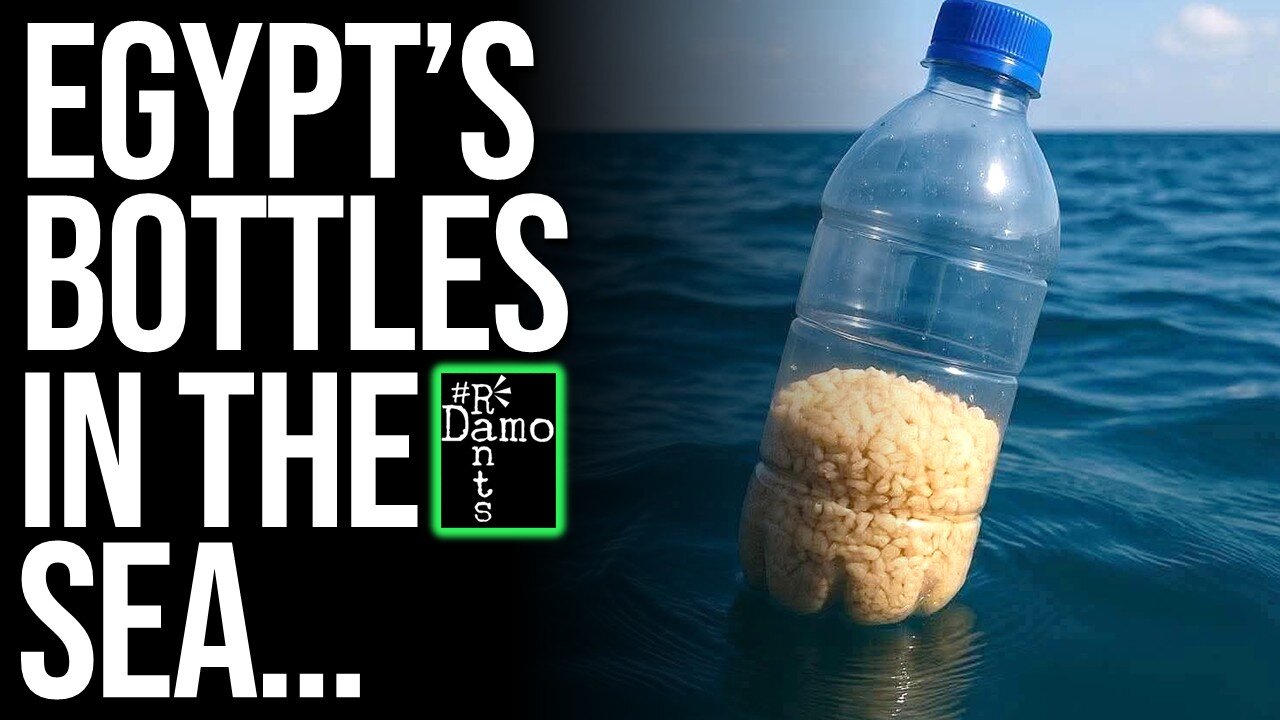Premium Only Content

Why Are Bottles of Grain Floating to Gaza?
Right, so picture this for a second. A man standing on the Egyptian shore, hurling bottles filled with grain into the Mediterranean Sea in the hope that they might drift to Gaza, there’s video of it going viral on social media right now that has created an image that I think will probably endure far beyond the news cycle. It is both absurd and profoundly symbolic at the same time, capturing the tragic essence not only of Israel’s war of starvation, its genocide on the people of Gaza, but of Egypt’s moral collapse in the face of Gaza’s humanitarian catastrophe. This man, armed with nothing but his compassion and his blind faith in ocean currents, is attempting to do what one of the most powerful states in the Arab world refuses to do: feed starving children trapped just beyond its border. The act is a gesture of futility, but also of defiance. It exposes the Egyptian government’s indifference, that when they have a boder crossing into Gaza, Sisi is effectively the jailer of Rafah, his deliberate political choice to keep the Rafah crossing restricted despite the suffering just a few kilometres away. This gesture whilst unlikely to achieve what this guy and others like him would like it to, has exposed Egypt’s pro Israel leanings in the face of genocide, possibly more starkly than an media headline ever has.
Right, so Egypt once called itself the beating heart of Arab nationalism, the elder brother of the Palestinian cause, the spearhead of Arab resistance to Zionism. That identity has been thoroughly abandoned under President Abdel Fattah el-Sisi. Today, the Egyptian state acts as Israel’s partner in the siege, tightening the chokehold on Gaza’s 2 million people by controlling the only non-Israeli land crossing. While Israel bombs food convoys and destroys farmland, Egypt keeps the Rafah gates closed, blocking humanitarian trucks. Where Israel violates a 46 year old peace agreement with Egypt, Sisi has just allowed them to remain there, covering for his own inaction. This is not mere negligence; it is active complicity in a war of starvation. A war crime. A genocide.
Egypt is not a neutral bystander here, but an enabler of Gaza’s suffering.
Any examination of Egypt’s role must begin by acknowledging the scale and deliberate nature of the humanitarian catastrophe in Gaza. Israel has turned starvation into a weapon. The World Health Organisation’s Director-General, Tedros Adhanom Ghebreyesus, described the crisis as man-made mass starvation, explicitly rejecting the idea that this was a natural disaster. He has stated that this is not humanitarian failure; this is a policy decision that deprives civilians of food and medicine. The WHO report from just yesterday has confirmed that twenty-one children under the age of five had already died of malnutrition, with thousands more facing severe acute malnutrition, a condition that is fatal without immediate intervention.
The UN Office for the Coordination of Humanitarian Affairs corroborated this grim reality in its Humanitarian Situation Update #300, revealing that more than 18,800 children have been treated for acute malnutrition this year, with over 2,500 suffering severe acute malnutrition, a stage often described by doctors as “a death sentence in slow motion.” The Norwegian Refugee Council added that its staff inside Gaza are now themselves starving due to the complete collapse of food supplies. “There are no aid supplies left,” the organisation warned. “Our staff are watching children die, and there is nothing left to give them.”
Human Rights Watch, in its 2024 report They Destroyed What Was Inside Us, documented how Israel has systematically targeted Gaza’s food systems, from bakeries and grain storage facilities to water treatment plants and farms. The report concluded that these were not incidental strikes but part of a broader policy of collective punishment. UN Palestine Envoy Riyad Mansour was even more direct, stating to the UN that Israel was using “hunger as a weapon,” accusing global powers of complicity through their silence. This is deliberate starvation, not humanitarian failure and therefore those who enable this must be seen to be complicit.
In that context, Egypt’s actions cannot be dismissed as neutral and when it comes to complicity, they have bigger questions to answer than most given they literally have a doorway into Gaza. As the controller of the Rafah crossing, Egypt possesses the unique ability to bypass Israel’s siege and deliver large-scale humanitarian aid. Its decision to instead maintain severe restrictions makes it an indispensable partner in this starvation campaign.
Egypt’s decision to restrict aid to Gaza is not a product of logistical necessity but a calculated political choice rooted in security narratives, financial dependencies, and diplomatic opportunism. Sisi’s government justifies its actions by invoking security concerns, claiming that Hamas’ presence poses a threat to Egypt’s stability due to alleged links with Sinai-based insurgents. This narrative, however, is widely seen by analysts as exaggerated, designed more to align with Israeli security concerns than to address genuine threats.
Economic and political calculations are far more decisive. Egypt receives $1.3 billion annually in US military aid, a lifeline that keeps its heavily militarised regime afloat. Washington has made it clear that this aid depends on maintaining the Camp David accords and cooperating with Israeli security policy. That’s a sick joke, given that Israel has controlled the Philadelphi Corridor buffer zone region that encompasses the Rafah Crossing in direct violation of the Camp David Accords of course, but we know who’s side Trump and Biden before him are on don’t we? Fully opening Rafah to unrestricted humanitarian convoys would risk angering both Washington and Tel Aviv, potentially jeopardising this vital funding.
Furthermore, Egypt’s economic entanglement with Israel has deepened in recent years. Sisi has positioned Egypt as a regional gas hub, importing Israeli natural gas from the Leviathan and Tamar fields, liquefying it, and selling it to European markets desperate for alternatives to Russian energy. This arrangement, worth billions, gives Israel significant leverage, ensuring that Cairo will not act in ways that threaten this partnership.
Finally, Rafah itself is a political bargaining chip. By keeping the crossing tightly controlled, Egypt ensures that it remains indispensable to Western and regional diplomacy. Cairo positions itself as the gatekeeper to Gaza, a role that grants it leverage in ceasefire negotiations and international mediation. A fully open Rafah would strip Sisi of this diplomatic relevance, reducing his regime to a mere bystander rather than a power broker. Therefore Sisi is less Gaza’s gatekeeper and more its jailer.
These cold calculations represent a profound moral and historical betrayal. Egypt once styled itself as the champion of Palestine and the heart of Arab solidarity. Under Gamal Abdel Nasser, Egypt was at the forefront of the anti-Zionist struggle, allowing Palestinian fedayeen to operate from Gaza and promoting pan-Arab unity around the Palestinian cause. Even Anwar Sadat, whose Camp David accords marked a major retreat from pan-Arabism, justified his peace treaty as a pragmatic step to reclaim Egyptian territory, not as an active collaboration in Palestinian suffering.
Sisi’s Egypt goes much further. Where Nasser’s soldiers crossed the Suez Canal in 1973 to confront Israeli occupation, Sisi’s forces now block the routes that once carried flour and medicine into Gaza. Egypt, which once prided itself as the protector of Arab dignity, now enforces the starvation of fellow Arabs at Israel’s behest. The transformation from Nasser to Sisi is not just political but symbolic, marking the end of Egypt’s claim to moral leadership in the Arab world.
What makes this betrayal even starker is that it is not shared by the Egyptian people. Ordinary Egyptians have not abandoned Gaza; their government has, exemplified by these bottles of grain bobbing in the Mediterranean. Public sympathy for Palestine remains deeply ingrained in Egyptian society, rooted in decades of shared history, cultural solidarity, and a sense of pan-Arab identity. Since October 2023, protests have erupted across Cairo, Alexandria, and other cities despite strict anti-protest laws. Chants of “Netanyahu’s partner” have been directed at Sisi, and protesters have risked arrest to demand that Rafah be opened to humanitarian convoys.
Grassroots efforts to send aid have been repeatedly blocked. Trade unions, student groups, and medical organisations have attempted to organise convoys of food and medical supplies, only to be turned back by military checkpoints. Some activists have been arrested for attempting to bypass official restrictions. This deep divide between popular will and state policy underscores the extent to which Sisi’s government operates against the conscience of its own people.
The image of the man throwing bottles of grain into the sea symbolises this divide perfectly. It is a silent accusation against the Egyptian state: if one man with no resources can attempt to help Gaza, what excuse does a government with an entire army have for doing nothing? It also highlights a larger truth — in today’s Arab world, it is ordinary people, not governments, who are the true defenders of Palestine.
Egypt’s role in Gaza’s famine cannot be dismissed as passive complicity. It is an active enabler of the starvation siege. Rafah, Gaza’s only non-Israeli crossing, has been reduced to a chokehold under Israeli and Egyptian control.
Refugees International describes Egypt as a “critical enabler of famine conditions,” while the International Crisis Group warns that Egypt risks “complicity in the use of starvation as a method of warfare,” a crime under international law. Under the Rome Statute of the International Criminal Court, knowingly contributing to collective punishment of civilians can constitute aiding and abetting war crimes. The legal argument for Egypt’s complicity is compelling, and while Sisi is unlikely to face accountability in the short term, history may judge him harshly.
Sisi’s complicity in Gaza’s suffering has already begun to erode his legitimacy though, particularly at home. His regime has long relied on nationalist propaganda, portraying him as the protector of Egypt’s sovereignty and Arab dignity. That narrative is now collapsing. Protests, though tightly suppressed, are a warning sign of growing discontent, especially as economic hardship deepens, Sisi’s regime having riddled the country with debt.
Regionally, Egypt has lost the moral authority it once held. Once seen as the undisputed leader of the Arab world, it is now seen as a client state serving Western and Israeli interests.
Internationally, however, Sisi has faced no real repercussions at all, much of this might be news to some people, who might recall the Egyptian plans to rebuild Gaza as a sign of Egypt’s stance. On the contrary, his cooperation has made him more indispensable to the United States and European Union, who rely on him to keep Rafah sealed while maintaining the façade of humanitarian concern. Western powers continue to fund his regime generously, valuing stability and Israeli security over Palestinian lives.
The real consequence may come later. Just as Sadat’s peace treaty with Israel defined his legacy, Sisi will be remembered as the president who enforced a starvation siege on fellow Arabs.
The bottles of grain floating aimlessly in the Mediterranean should haunt Sisi and his allies. They tell a story more powerful than any diplomatic statement or military justification: an ordinary man, with no power and no resources, trying to feed starving children while his government does nothing. Egypt, which once fought and bled for Palestine, now keeps the one door to Gaza locked while famine spreads.
History will not remember the security excuses or diplomatic calculations. It will remember the children who starved and the gate that could have been opened. Egypt holds the key to Gaza’s survival, but under Sisi, it has chosen to keep that key turned firmly in Israel’s lock.
One man threw grain to the sea. Abdel Fattah el-Sisi, with all the resources of the Egyptian state at his disposal, has thrown Egypt’s honour into it instead.
For more on Sisi’s complicity and his pro Israel leanings do check out further stories in this regard in this video recommendation here as your suggested next watch.
Please do also hit like, share and subscribe if you haven’t done so already so as to ensure you don’t miss out on all new daily content as well as spreading the word and helping to support the channel at the same time which is very much appreciated, holding power to account for ordinary working class people and I will hopefully catch you on the next vid. Cheers folks.
-
 LIVE
LIVE
The Nick DiPaolo Show Channel
2 hours agoDems + Media Killed Kirk | The Nick Di Paolo Show #1792
2,980 watching -
 LIVE
LIVE
Candace Show Podcast
19 minutes agoTo My Friend, Charlie Kirk.
6,702 watching -
 50:24
50:24
Donald Trump Jr.
4 hours agoFor Charlie
235K236 -
 1:04:09
1:04:09
TheCrucible
1 hour agoThe Extravaganza! EP: 35 (9/11/25)
35K12 -
 1:19:43
1:19:43
Dr. Drew
6 hours agoCharlie Kirk Assassination: 24 Hours Later, What We Know About The Utah Valley University Shooting w/ Salty Cracker, Free Speech Activist Douglass Mackey & Experts – Ask Dr. Drew
37.3K8 -
 1:17:50
1:17:50
Redacted News
2 hours agoBREAKING! CHARLIE KIRK'S ASSASSIN IDENTIFIED, NATIONWIDE MANHUNT UNDERWAY | Redacted News
233K209 -
 1:05:30
1:05:30
vivafrei
5 hours agoCharlie Kirk Assassination FBI Updates - With FBI Whistleblower Kyle Seraphin
244K135 -
 1:59:22
1:59:22
The Quartering
4 hours agoJustice For Charlie Kirk! FBI Releases Photo Of Shooter, Mass Firings For Those Who Celebrate!
246K153 -
 36:31
36:31
Stephen Gardner
3 hours ago🔥NEW: FBI's Bombshell Reveal on Charlie Kirk Assassin!
62.2K197 -
 LIVE
LIVE
RealAmericasVoice
3 days agoHOME OF REAL NEWS
6,414 watching